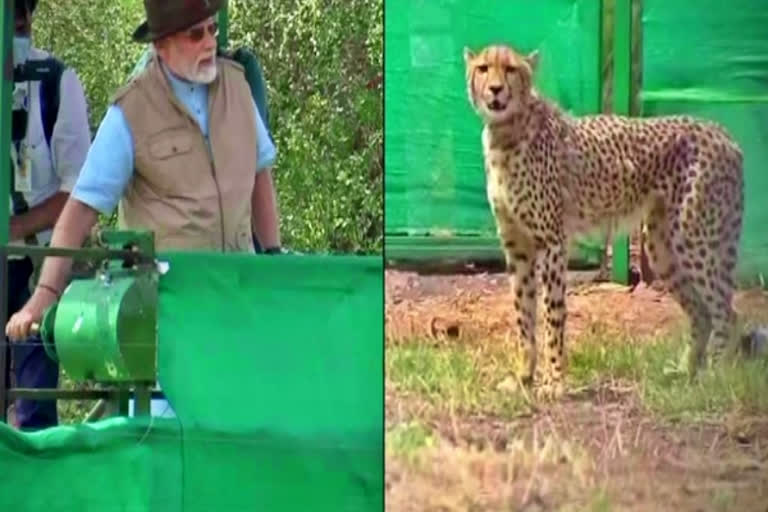Gwalior:Prime Minister Narendra Modi on Saturday said that Project Cheetah under which the big cats were reintroduced in the country after they went extinct in India 70 years ago, is the Centre's endeavor in wildlife conservation and protecting the environment.
"Project Cheetah, under which the cheetahs were reintroduced in the country after they became extinct seven decades ago, is our endeavor towards environment and wildlife conservation," said Modi.
PM releases cheetahs in Kuno Describing the big cats as "our guests" the Prime Minister said that they should be given a few months to get used to their new home, the Kuno National Park. "Cheetahs are our guests; we should give them a few months to make Kuno national park their home," said Modi.
Earlier in the day, the Prime Minister released the cheetahs from Namibia in the Kuno National Park in Madhya Pradesh. The Prime Minister will also attend a program of Self Help Groups in Sheopur in the State.
The Prime Minister, seen to be in a jovial mood, also clicked photos of the big cats with a professional camera. Modi, who is celebrating his birthday on Saturday, released two cheetahs into an enclosure at the national park. He was accompanied by Madhya Pradesh Chief Minister Shivraj Singh Chouhan.
The Kuno National Park is situated on the Northern side of the Vidhyachal mountains with an area of 344.686 sq km. It was named after a tributary of the Chambal River, Kuno. Cheetahs were declared extinct in India in 1952. The last cheetah died in the country in 1947 in the Korea district in present-day Chhattisgarh, which was earlier part of Madhya Pradesh.
The eight cheetahs from Namibia finally arrived in India earlier in the day. The special chartered cargo flight bringing the big cats landed at the Indian Air Force Station in Gwalior. The IAF helicopter carrying the cheetahs has reached Palpur near Kuno National Park.
The flight carrying eight cheetahs and crew left Windhoek, the capital of Namibia in Africa, at around 8.30 pm (Indian time). The cheetah intercontinental translocation project took place at a time when India has completed 75 years of its independence. The eight cheetahs - five females and three males - brought from Namibia as part of 'Project Cheetah', the world's first inter-continental large wild carnivore translocation project, officials said.
In a departure statement, India's High Commissioner to Namibia Prashant Agrawal said, "this is a very special moment indeed. As these magnificent cheetahs board the flight to India, we are being witness to history being made here today."
"This is a global first. This intercontinental translocation is the first of its kind, with no parallels ever. The reintroduction has a special significance as India marks its 75th independence anniversary this year," he added.
Also Read:President Murmu extends birthday greetings to PM Modi
The Indian envoy thanked the team of Cheetah Conservation Fund (CCF) led by Dr Laurie Marker for making significant contributions in executing the translocation project. These cheetahs are the goodwill ambassadors for India-Namibia relations and, indeed, for the cause of conservation of the fastest land animal all over the world, he said.
Earlier in the day Madhya Pradesh Chief Minister released a glimpse of a cheetah arriving at KNP which sounds Meow on his Twitter handle. "It is a matter of extreme happiness that cheetahs are coming to Kuno National Park. We the people of Madhya Pradesh are eager to welcome our new guests," Chouhan said in a tweet.
Congress leader Digvijaya Singh tweeted, "Some more of the same Cheetah. Grateful to Dr Manmohan Singh ji Jairam Ramesh ji and now Modi ji but above all Ranjit Sinh ji Retd IAS a keen Wildlifer who led the campaign."
The last cheetah died in the country in 1947 in Korea district in present day Chhattisgarh, which was earlier part of Madhya Pradesh, and the species was declared extinct from India in 1952. The 'African Cheetah Introduction Project in India' was conceived in 2009. A plan to introduce the big cat in the KNP by November last year was delayed due to the COVID-19 pandemic. (with Agency inputs)
